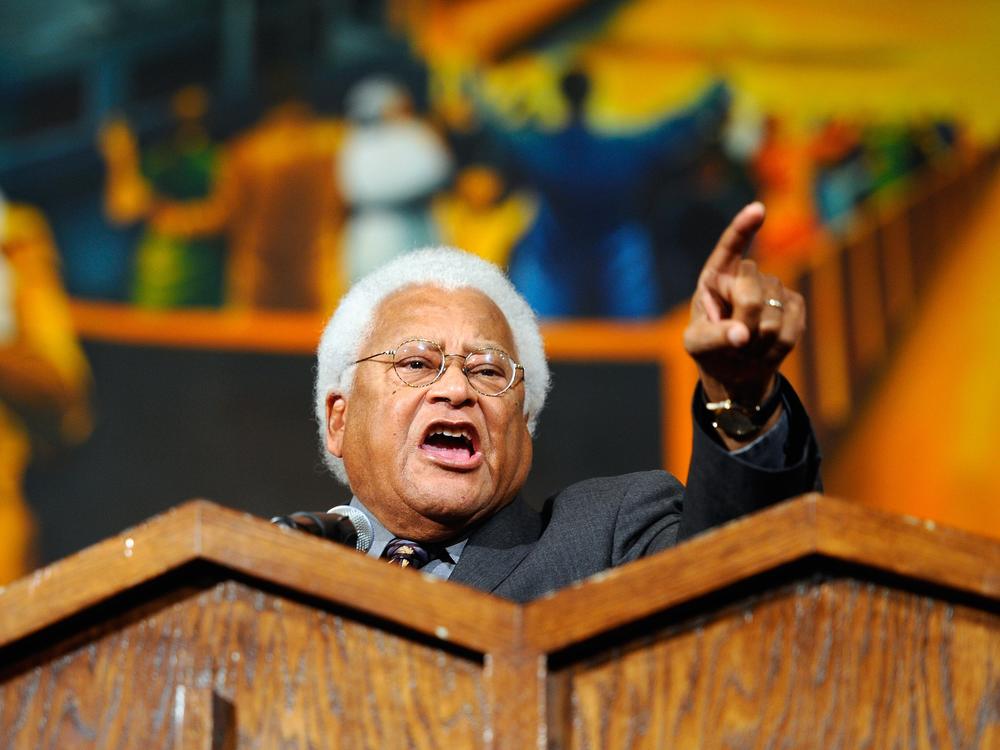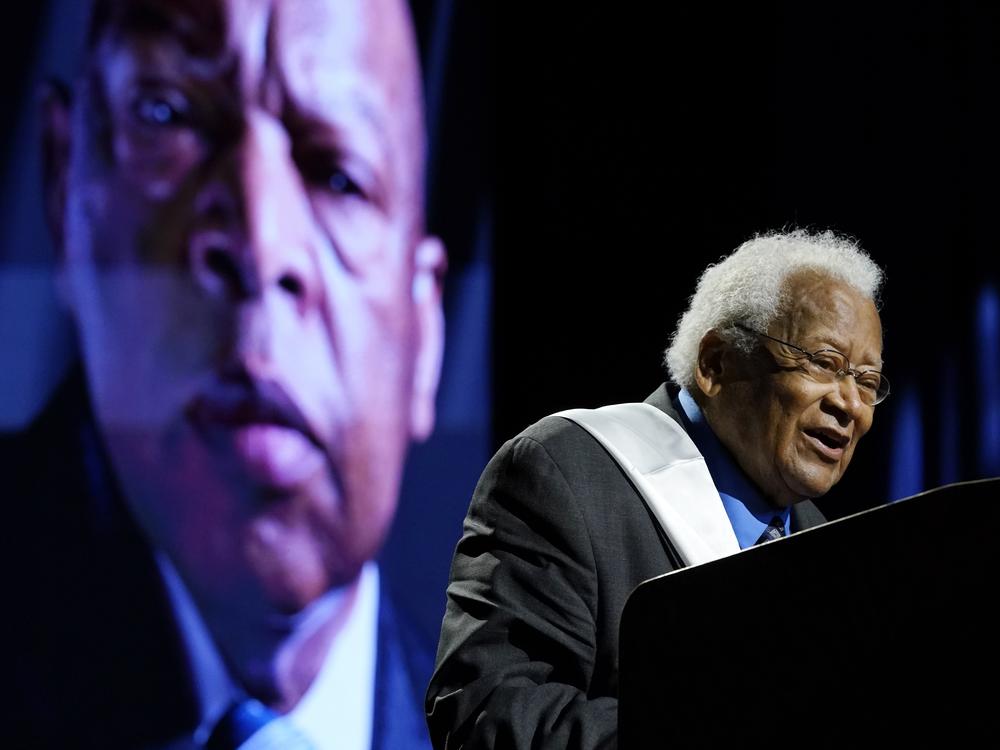Section Branding
Header Content
The Rev. James Lawson, key architect of the Civil Rights Movement, dies at 95
Primary Content
The Rev. James Lawson was a staunch advocate for nonviolent resistance to racism, even in the face of brutality. A Methodist minister and student of Gandhi, Lawson mentored civil rights leaders and was the tactician behind key desegregation campaigns in the South, including the Nashville sit-ins, the Freedom Rides, and the Birmingham Children’s Crusade. The Rev. Martin Luther King Jr. called him the leading theorist and strategist of nonviolence.
Lawson was 95 and died Sunday in Southern California, according to his son J. Morris Lawson III.
James Morris Lawson Jr. was born in Uniontown, Pa., in 1928. His father and grandfather were Methodist ministers, but Lawson credited his mother, Philane, for instilling in him the power of nonviolent resistance.
In a 2018 interview with NPR, he described coming home from an altercation as an 8-year-old child.
“For the first time after running an errand on a spring day, I had just slapped a white child for calling me the N-word,” he said.
He said his mother asked him “what good that served?” and told her son to find a better way.
“So as a consequence of that conversation . . . I decided that I would never again fight with my fists to hurt somebody to beat up people on the playing field or in response to racist hatred.”
A student of Gandhi
As a student at Baldwin Wallace College in Berea, Ohio, Lawson joined the Fellowship of Reconciliation, a pacifist group, and served time in prison for refusing to register for the military draft. In the 1950s, as a Methodist missionary in India, he studied the nonviolent philosophy of Mahatma Gandhi.
Lawson said he found Gandhi’s teachings in line with the philosophy of his Christian faith, calling Jesus the “super athlete” of nonviolence.
“There’s no better weapon than that for bringing about personal and social change,” he said.
Back home at the Graduate School of Theology at Oberlin College in Ohio, he met the Rev. Martin Luther King Jr. It was 1957, and King was fresh off the successful Montgomery bus boycott in Alabama that integrated public transportation. Lawson told NPR they immediately found common ground, and King encouraged him to come South.
“He said very quickly without reservation, ‘Come now. Don’t wait. We need you now,’” Lawson recalled.
Mentoring a generation of civil rights activists
The two began correspondence, and Lawson transferred to Vanderbilt University in Nashville. There he led Saturday workshops in nonviolent strategies, drawing students from nearby colleges. He devised a plan to desegregate downtown, charting a course of sit-ins, pickets, economic boycotts and other nonviolent direct actions.
The idea was to build on what King, Rosa Parks and others had achieved in Montgomery, and to grow what Lawson considered to be a Black freedom movement with staying power.
“Was the Montgomery bus boycott an accident? Can it happen again? And if so, where? And what is it to become?” Lawson said of their thinking at the time. “King and [Ralph] Abernathy and others of us were persuaded it was not a fluke, but the time was now.”
Lawson traveled around the South, in coordination with King, to prepare activists for nonviolent action, giving them the tools and tactics needed to face violent pushback from white supremacists. The list of Lawson’s students reads like a who’s who of civil rights luminaries, among them — John Lewis, Diane Nash, James Bevel, Bernard Lafayette, and the Little Rock Nine, the Black students who integrated Central High School.
In a 1998 interview with NPR, Georgia Congressman John Lewis recalled his early embrace of the movement as a student in Nashville.
“When I first heard of Jim Lawson, this young Black Methodist minister, preaching and teaching the philosophy of love and action, nonviolence, passive resistance, soul force — I knew this was for me,” Lewis said. “I knew this was the way out.”
Lawson was instrumental in the formation for the Student Non-Violent Coordinating Committee (SNCC) and drafted the organization’s statement of purpose. He was also active in the King-led Southern Christian Leadership Conference (SCLC) and the Congress of Racial Equity (CORE).
Fighting for workers' rights in Memphis
He was expelled from Vanderbilt after being arrested at protests. By 1968, Lawson, then a pastor in Memphis, was mapping strategy for a sanitation workers’ strike with the slogan “I Am A Man.”
“When a public official orders a group of men to get back to work, and …. treats them as though they are not men, that’s a racist point of view,” he said at a news conference in 1968. “For at the heart of racism is the idea that a man is not a man.”
Lawson later said he was trying to encourage the Black sanitation workers to claim their humanity.
“You're a child of God. You are somebody,” he said. “Segregation tries to pretend that you're not a human being; you're not a man. But you have to fight that.”
It was Lawson who recruited Martin Luther King to march with the striking sanitation workers in Memphis, a fateful decision. The night before King was assassinated on the balcony of the Lorraine Motel, he praised Rev. Lawson during what would become his final speech.
“I want to commend the preacher under the leadership of these noble men, James Lawson, one who has been in this struggle for many years,” King said from the pulpit of Mason Temple. “He's been to jail for struggling. He's been kicked out of Vanderbilt University for this struggle, but he's still going on fighting for the rights of his people.”
Fifty years later, Lawson remembered that evening in vivid detail
“For me, it was one of the zenith experiences of a whole movement,” he said. “There was a sense inside of warmth and unity. We're engaged in a great struggle.”
Lawson decried the riots and violence that broke out after King’s killing. He said the assassination sapped both momentum for change, and support for nonviolent resistance.
“That has continued to grieve me — his death,” Lawson told NPR in 2018. “It happened in Memphis. Wherever it was going to happen, that still grieves me because of what it did to the nation. The loss.”
Lawson befriended the man who confessed to killing King, James Earl Ray. He ministered to Ray in prison and presided at his funeral.
Social justice and peace activist
Lawson was the pastor of Holman United Methodist Church in Los Angeles for much of his latter career and remained active well into his 90s, teaching nonviolent strategies to young activists and engaging in campaigns for a number of social justice issues. He advocated for gay and workers’ rights, for instance, and spoke against war.
In 2020, he was a speaker at his former student John Lewis’ funeral.
“I maintain that many of us had no choice to do what we tried to do, primarily because at an early age we recognized the wrong under which we were forced to live,” he said. “And we swore to God that by God's grace, we would do whatever God called us to do in order to put on the table of the nation's agenda. This must end! Black Lives Matter!”
In 2022, Vanderbilt University, which expelled him in 1960, established the James Lawson Institute for the Research and Study of Nonviolent Movements.
Lawson never gave up on the idea that the Black freedom movement would succeed. He called it the second major American revolutionary struggle.
“Ultimately the hatreds, the violence, the fears, the greed, the will to dominate and control, cannot prevail and will not prevail.”


